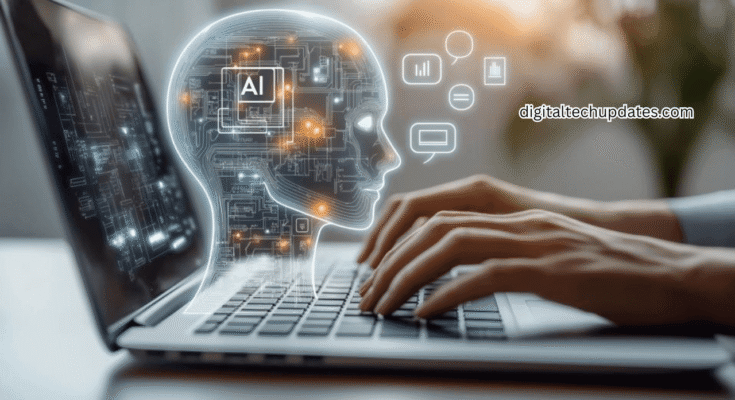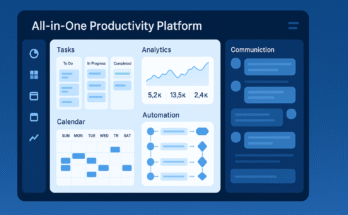Introduction: How AI Is Powering the Future of Small Business
The world of business has changed faster in the last three years than in the previous decade — and the reason is clear: Artificial Intelligence (AI).
What once felt like futuristic technology is now an everyday tool for small business owners around the world. From writing marketing emails to analyzing customer behavior and automating operations, AI has become a business partner rather than just a tool.
In 2025, AI isn’t about replacing humans; it’s about helping small teams do more with less. For entrepreneurs juggling multiple roles, AI tools are the secret to saving time, reducing costs, and scaling faster than ever before.
In this article, we’ll explore the top emerging AI tools for small businesses in 2025, how they’re transforming industries, and practical ways you can use them to stay ahead of competitors.
Why AI Matters More Than Ever for Small Businesses
AI has become an equalizer — giving small businesses the kind of power that only big corporations once had.
Here’s why 2025 is the perfect year to integrate AI into your workflow:
Automation saves time: AI tools handle repetitive tasks like replying to emails, scheduling, and reporting, letting you focus on strategy.
Better decisions: Predictive analytics tools use data to forecast demand, track customer behavior, and help you make smarter decisions.
Personalized marketing: AI algorithms help tailor your ads and content for specific customers, improving conversions.
Global scalability: Cloud-based AI tools allow even small teams to serve customers worldwide.
Affordable solutions: Most AI tools now have free or low-cost plans, perfect for small businesses on a budget.
In short, AI turns time-consuming tasks into smart, automated processes, giving small businesses a competitive edge globally.
Top AI Trends Shaping Small Business Growth in 2025
Let’s take a look at what’s new in 2025. These are the AI trends driving innovation and efficiency for entrepreneurs and startups.
a. Generative AI for Content Creation
Tools like ChatGPT, Jasper AI, Copy.ai, and Writesonic allow small businesses to produce blogs, social media captions, and ad copy effortlessly.
AI-driven writing assistants now understand tone, brand style, and context — meaning they create content that actually sounds human.
💡 Pro Tip: Use generative AI for brainstorming and first drafts, but always edit to reflect your brand’s authentic voice.
b. AI in Marketing and Advertising
Marketing automation has exploded in 2025. Tools such as HubSpot AI, AdCreative.ai, and Phrasee help marketers create and optimize ads that convert.
AI platforms now analyze thousands of data points to determine which image, color, or headline will attract the most engagement.
For small business owners, this means more effective campaigns with less guesswork — and often at a lower cost than traditional advertising.
c. Conversational AI and Customer Support
Gone are the days of long customer service queues. Tools like Intercom AI, Zendesk AI, Drift, and Tidio allow small businesses to offer 24/7 chat support.
These AI chatbots can answer common questions, process returns, and even recommend products — all without human involvement.
The best part? They’re constantly learning from past conversations to respond more naturally, improving customer satisfaction and saving time.
d. AI for Finance and Bookkeeping
Managing money can be one of the hardest parts of running a small business. That’s where AI finance tools come in.
Platforms like QuickBooks AI, Xero, and FreshBooks now include smart assistants that categorize expenses, predict cash flow, and detect fraud in real-time.
This automation means fewer human errors, faster reporting, and better financial visibility — all crucial for growth.
e. AI in HR and Recruitment
Hiring the right person has always been tricky, but AI is simplifying the process.
Tools such as HireVue, Zoho Recruit, and Paradox AI help businesses screen candidates, schedule interviews, and assess skills through video analysis and resume scanning.
AI ensures fairness and saves valuable HR time — especially for companies without dedicated HR departments.
Best Emerging AI Tools for Small Businesses in 2025
Here’s a curated list of the top AI tools that small businesses around the world are adopting this year, along with what makes them stand out.
1. ChatGPT (OpenAI)
Purpose: Content creation, brainstorming, customer support
Why it’s great: It’s versatile, fast, and affordable. You can generate emails, blog posts, scripts, and product descriptions in seconds.
Use it for: Creating social media content, FAQs, marketing emails, and customer responses.
2. Jasper AI
Purpose: Marketing copy and SEO writing
Why it’s great: Jasper specializes in tone-specific writing for blogs, ads, and landing pages.
Use it for: Scaling your content marketing and improving search rankings.
3. Notion AI
Purpose: Productivity and content organization
Why it’s great: Helps teams manage projects, take AI-assisted notes, and summarize long documents.
Use it for: Streamlining daily tasks and enhancing team collaboration.
4. Synthesia
Purpose: AI video creation
Why it’s great: Converts text into professional videos with virtual avatars — no camera or editing needed.
Use it for: Creating explainer videos, tutorials, or social media content.
5. Pictory
Purpose: Video marketing automation
Why it’s great: Turns blog posts and scripts into short marketing videos using AI.
Use it for: YouTube, Instagram, and ad campaigns.
6. Grammarly Business
Purpose: AI-powered writing assistant
Why it’s great: Detects grammar, tone, and clarity issues in real-time.
Use it for: Maintaining professional communication across your team.
7. ClickUp AI
Purpose: AI productivity and task management
Why it’s great: Automates repetitive project tasks and creates summaries from updates or reports.
Use it for: Remote team management and workflow automation.
8. Fireflies.ai
Purpose: Meeting transcription and insights
Why it’s great: Records, transcribes, and summarizes meetings automatically.
Use it for: Managing remote teams and improving client communications.
9. Midjourney
Purpose: AI-generated visuals and design
Why it’s great: Creates high-quality images from text prompts for marketing or branding.
Use it for: Product design, creative visuals, and branding.
10. ElevenLabs
Purpose: AI voice generation
Why it’s great: Turns text into realistic human voices for videos, podcasts, or customer support bots.
Use it for: Audio content and interactive user experiences.
How to Choose the Right AI Tools for Your Business
Not every AI tool will fit your needs. Here’s how to choose wisely:
Define your pain points: Identify what’s taking most of your time — marketing, support, or finance.
Set a clear goal: Do you want to save time, increase revenue, or improve accuracy?
Start small: Begin with one or two tools and expand gradually.
Train your team: Make sure employees understand how to use AI effectively.
Track performance: Use analytics to see how much time or cost you’re saving.
The best AI strategy is balanced — combining automation with human creativity.
The Benefits of Using AI for Small Businesses
Adopting AI can bring several measurable benefits:
Increased efficiency: Automate repetitive tasks and focus on strategic work.
Cost reduction: Save money on marketing, customer support, and admin tasks.
Better customer experiences: Offer faster, more personalized service.
Smarter marketing: Target the right audience with precision.
Competitive advantage: Stay ahead of businesses that are still doing everything manually.
AI doesn’t replace your team — it amplifies their capabilities.
Real-World Examples of AI in Small Businesses
Let’s look at how small companies are using AI in real life:
A bakery in London uses AI to predict daily sales and reduce ingredient waste by 30%.
A digital agency in California automates client reporting using ChatGPT and Google Sheets integration.
An online clothing brand uses Midjourney and Canva AI to design product visuals in minutes instead of hours.
A coaching business in India uses AI transcription (Fireflies.ai) to turn online sessions into blog content automatically.
These stories prove that you don’t need a massive budget to make AI work — just the right tools and strategy.
The Future of AI for Small Businesses
In 2025 and beyond, AI will continue to evolve in three main areas:
Hyper-personalization: Businesses will be able to tailor every customer experience based on real-time data.
AI agents and automation: Virtual assistants will handle multi-step processes like bookings, invoicing, and support.
Integration with AR and VR: AI will merge with virtual experiences to create interactive online stores and learning environments.
The future belongs to businesses that learn how to blend human creativity with AI-driven efficiency.
Common Myths About AI for Small Businesses
Let’s clear up some confusion that often prevents small business owners from adopting AI:
❌ “AI is too expensive.”
→ Most tools have free or budget-friendly tiers.❌ “AI will replace human jobs.”
→ AI supports human work — it doesn’t replace creativity, empathy, or judgment.❌ “It’s too complicated to use.”
→ Today’s AI platforms have simple dashboards and one-click integrations.❌ “AI is only for tech companies.”
→ From bakeries to salons, every business can benefit from automation.
Frequently Asked Questions (FAQs)
Q1: Which AI tools are best for small business owners?
A: ChatGPT, Jasper AI, Grammarly Business, and Notion AI are among the most recommended for productivity, writing, and marketing.
Q2: Can AI replace employees in small businesses?
A: Not entirely. AI handles repetitive tasks so employees can focus on higher-value creative and strategic work.
Q3: Are AI tools affordable for startups?
A: Yes, most tools have free plans or affordable monthly subscriptions.
Q4: Is AI safe to use for business data?
A: Reputable AI providers follow strict security and privacy guidelines. Always check data policies before integrating any tool.
Q5: How do I train my team to use AI tools?
A: Start with online tutorials, YouTube training, or workshops from the tool provider.
Conclusion: The Smartest Step You Can Take in 2025
AI is transforming the way the world does business — and it’s not just for tech giants anymore.
For small businesses, adopting AI in 2025 is about working smarter, not harder. Whether it’s automating marketing, improving customer service, or managing operations more efficiently, there’s an AI tool designed for every need.
The key is to start today. Choose one or two tools that solve your biggest challenges, learn how to use them effectively, and grow from there.
In the coming years, small businesses that integrate AI will not only survive — they’ll lead.




